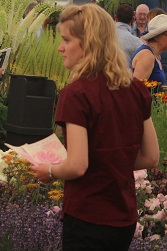
Advances your researching skills
- 100 hours of self-paced study
- Start any time, work at your own pace
- Relate your work to any branch of horticulture
COURSE CONTENT
There are 7 lessons in this module as follows:
-
Identifying research issues and determining research priorities
-
Acquisition of technical information
-
Specialised research techniques
-
Research planning and designing
-
Statistics
-
Conducting research
-
Writing reports.
WHAT NEEDS RESEARCH
Research can be valuable, contributing to our understanding of what factors are influencing observed outcomes, which need changing, and what specific changes may be needed. On the other hand, irrelevant or needless research, no matter how well done or how detailed, can waste time, energy and money that could have been much better applied elsewhere.
Therefore, the first step in doing relevant, worthwhile research is to identify areas, social groups, markets, or organisations that might benefit from research, and the kind of information that might be useful. This is a vital step as much of the governmental and private funding today is tied to these constraints.
The second step is to arrive at a specific topic for research, one that clearly articulates the aim of the research, and defines the focus for the research. It defines clearly the goals: what are we doing the research for?
The third step is to consider whether the proposed research is realistic. This is a necessary step on the analysis as it will help determining the strategies, how we will approach and study the problem. Can it be done in a realistic time frame? Has it already been thoroughly researched by someone else? Are there still important questions to be asked? Is there enough information? Steps two and three may need to be repeated several times before the final research topic is identified.
Aims
- Determine areas where there is a valid need to research processes relevant to horticultural research in today’s social, economic, political and environmental context.
- Acquire and demonstrate skills in locating and reviewing scientific and technical information.
- Develop and explain alternative research and observational techniques for a particular Horticultural research study.
- To design a quality and focused research project addressing a social, technological, environmental and/or economic issues that impact on Horticulture today. The research component must allocate resources needed (time, financial and human resources).
- Demonstrate and explain basic statistical knowledge used for research with emphasis on your ability to present and monitor given data.
- Conduct a quality and focused research project addressing a social, technological, environmental and/or economic issue that impact on Horticulture today.
- Demonstrate skills in report writing
What is in each lesson?
1. Identifying Research Issues and Determining Research Priorities
- Introduction: first, second, third steps
- Finding research ideas
- Brainstorming
- Steps to brainstorming Mind maps
- How to mind map
- Concept mapping
- Determining research priorities
- Beginning your research
- Formulating a research topic
- Is the research feasible
- Formulating a hypothesis
- Terminology
2. Acquisition of Technical Information
- Literature review
- Research methods
- Basic methods of collecting information: experimental, correlation, questionnaires, surveys, tests, document review
- Naturalistic observation
- Focus groups
- Case studies
3. Specialised Research Techniques
- Selecting a research method
- Fishbone diagrams
- Applications for cause and effect diagrams
- Lateral thinking
- Lateral thinking techniques
- Pareto analysis
- Observations
- Root cause analysis
4. Research Planning and Designing
- Project planning
- Defining the problem, possible solutions and objectives
- Problem tree analysis tool
- SWOT analysis
- Prioritise objectives and define activities
- Allocate resources
- Results and assessment
5. Statistics
- Introduction
- Data presentation
- Measures of central tendency
- Distributions
6. Conducting Research
- Collecting and logging data
- Developing a data base structure
- Data transformations
- Analyzing data
- Managing data
- Analytical procedure
7. Writing Reports
- Reporting results
- Report structure
- Contents of a research report (example)
- Pitfalls to avoid
How This Course Can Help You
This course builds on our Horticulture Research I module. It goes deeper into research methods and statistical analyses but also incorporates some new areas. Graduates completing this course will have a solid understanding of different approaches to research methods and design. The course is of most value to those looking to work in the following fields:
- Research
- Teaching
- Horticultural Science
- Garden History
- Botany
- Plant Breeding
- Botanic Gardens
WHAT NEXT?
Register to Study - Go to “It’s Easy to Enrol” box at the top of the page and you can enrol now.
or
Get Advice – Email us at info@acsedu.co.uk OR
Use our FREE COUNSELLING SERVICE to contact a tutor
CLICK TO CONTACT US